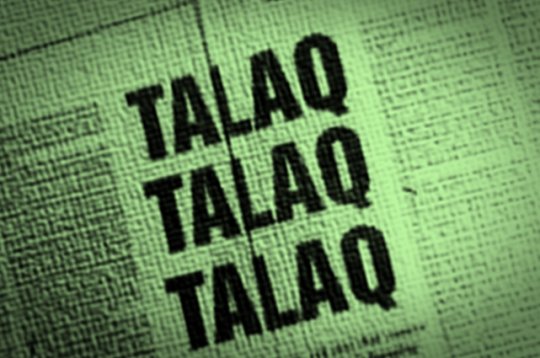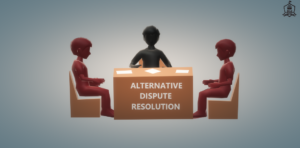After a Constitution Bench of Indian Supreme Court had held triple talaq invalid, the issue received lots of media-hype all over the world. The leading news media in both India and abroad published the issue highlighting that the Indian Supreme Court has struck down triple talaq as unconstitutional by a majority of 3:2. Was there really any majority judgement from Constitutional point of view?
Soon after promulgation of the judgement, it was published in the official website of the Indian Supreme Court. The Court said in Order: “in view of different opinions recorded, by a majority of 3:2 the practice of ‘talaq-e- biddat’ – triple talaq is set aside”. [1] But what is the implication for this majority of 3:2?
Two versus Two and a Judge in between
A five-judge Constitution bench of Indian Supreme Court passed the aforesaid Order examining the issue from both Constitutional and Islamic point of view. The Order is comprised of three different and diverse judgements. Two out of five judges, Justice Rohinton Fali Nariman concurred by Justice Uday Umesh Lalit held triple talaq unconstitutional for being manifestly arbitrary that violates the right to equality, a fundamental right conferred in Article 14 of Indian Constitution.[2] Chief Justice Jagdish Singh Khehar concurred by Justice S. Abdul Nazeer in his dissenting judgement declined to hold the issue unconstitutional concluding that the practice of triple talaq being a component of personal laws has the protection of Article 25 of the Constitution that guaranteed the freedom of religion.[3] They believed that it has a stature equal to other fundamental rights, conferred in Part III of the Constitution. Therefore, the practice cannot be set aside.[4]
The fifth, Justice Kurian Joseph, though ruled against triple talaq holding it unIslamic, but disagreed with the stand taken by Justice Rohinton Fali Nariman that this practice can be tested on the anvil of fundamental rights as the issue is not regulated by any legislation.[5] So, the judgement given by Justice Rohinton Fali Nariman on the ground of violation of fundamental rights stands in the minority. There were no majority judgements holding the issue unconstitutional.
Justice Kurian Josep’s “setting aside” instead of declaration of invalidity
To rule against triple talaq, Justice Kurian Joseph relied on some verses of the holy Quaran. Citing some verses from the holy Quran he concludes that the practice is held to be bad in the holy Quran, and what is bad in the holy Quran cannot be good in Shariat and therefore, it is bad in law.[6] A practice against the basic tenets of the holy Quran cannot be given any Constitutional protection.[7] He endorsed and re-iterated the law declared in Shamim Ara v. State of UP, 2002, where the issue was already held to be invalid in the eye of Islamic laws.[8] Justice Rohinton Fali Nariman has also upheld the law declared in Shamim Ara case that, in fact, made it a majority view to the extent of holding the issue set aside.[9]
It is pertinent to mention that, Darul Uloom Deoband, a leading center in the sub-continent for Islamic Studies situated in Uttar Pradesh of India, has always given Fatwa on triple talaq saying that it falls within the purview of Shariat. In a reaction after the verdict, its Public Relation Officer Mr. Ashraf Usmani says ‘triple talaq falls under the Shariat’.[10]
Justice Kurian Joseph raised question about the legal sanctity of only triple talaq, not the whole of Muslim personal laws. He wholly agreed with Chief Justice Jagdish Singh Khehar and Justice S. Abdul Nazeer that freedom of religion under Constitution is absolute. Personal laws of Muslims as fundamental rights are protected by the Constitution being an integral part of freedom of religion.[11] This concurrence made it a majority view to secure the Constitutional protection of Muslim personal laws. In fact, his judgement played role in both sides maintaining a delicate balance. It helped to set aside triple talaq as well as protect the personal laws of Muslims.
The judgement is spilt. Two judges held the issue unconstitutional, two judges secured its Constitutional protection, one judge held it ‘bad in law’ for being violative of Shariat but agreed to sustain the freedom of religion and in final Order the issue is “set aside.”
Confusion on protection of Personal Laws
To apply Shariat to the Muslims in their personal matters, the Muslim Personal Laws (Shariat) Application Act was passed in 1937. The Act is still in force in India, Pakistan and Bangladesh.[12] Whether this Act can be examined from Constitutional point of view that is to say that for violation of fundamental rights was a vital question in this case. As per Article 13 of Indian Constitution, ‘laws’ or ‘laws in force’ unless they are consistent with the fundamental rights are void.[13] But there were some precedents given by the Indian Supreme Court sustaining the protection of personal laws. In 1951, when the Constitutional validity of ‘Hindu Bigamous Marriages Act, 1916’ was challenged in the case of State of Bombay v. Narasu Appa Mali, the Bombay High Court held that the laws, which have statutory status, can only be tested to scrutinize the violation of fundamental rights and uncodified personal laws cannot be scrutinized for that purpose. Personal laws are neither ‘laws’ nor ‘laws in force’ for the purpose to scrutinize violation of the fundamental rights under Article 13 of Indian Constitution.[14] This ruling is applicable to the personal laws of both the Hindu and Muslim. Subsequently this judgement was also affirmed by the Indian Supreme Court in the cases of Shri Krishna Singh v. Mathura Ahir, (1981) and Ahmedabad Women Action Grpoup v. Union of India (1997).[15] In Ahmedabad case, the whole of Muslim personal laws was challenged but the Court referring to the Narasu Appa case dismissed the petitions.
Justice Rohinton Fali Nariman declined to follow these rulings regarding the Shariat Act. He held that 1937 Act is within the meaning of the expression ‘laws in force’ in Article 13 as it seeks to recognize and enforce triple talaq and hence he declared the issue as void for being violative of fundamental rights. [16]. In his observation, it is necessary to have a re-look at the judgement in Narasu Appa case and decide whether this judgement is good in law [17]. However, the Narasu Appa case was revisited twice in Shri Krishna Singh and Ahmedabad cases. He refrained from penning any single word about Shri Krishna Singh case. About Ahmedabad case, his opinion is same as Narasu Appa case that it is not good in law as it is contrary to at least two previous decisions of Constitution Bench.[18]
However, the rest of the judges, Chief Justice Jagdish Singh Khehar; Justice S. Abdul Nazeer and Justice Kurian Joseph, unanimously reached a conclusion that Muslim Personal Laws including triple talaq are not regulated by the Shariat Act. It has no statutory status. It simply makes Shariat applicable to the Muslims stating the words that the rule of decision in the personal matters like marriage, divorce succession, etc of a Muslim shall be the Shariat.[19] No law is codified in this Act. Therefore, it cannot be tested on the ground of violation of fundamental rights.
A case with an ulterior purpose
In the debate of triple talaq cases, the Union of India has adopted an aggressive posture seeking the invalidation of triple talaq from Constitutional point of view that the Chief Justice mentioned in the declaration part of his judgement.[20] Even it was argued that when the Hindu laws have undergone major reform in abolishing the devdasi system, sati and polygamy, why Muslim laws should remain unchanged.[21] The government is adamant to introduce a ‘Uniform Civil Code’ in the family matters like marriage, divorce, succession, etc for all religious groups in India. In an immediate reaction after the verdict, Mr. Mukul Rohatgi, the Attorney General of India said that the verdict is a step towards achieving the ultimate goal of a Uniform Civil Code.[22] However, the legal experts have said that the majority view to uphold the Constitutional protection of Muslim Personal Laws seem to be a clear message against any enactment of ‘Uniform Civil Code’.
No doubt that triple talaq is practiced arbitrarily by many Muslim men. But the issue has already been disposed of in the case of Shamim Ara v. State of UP in 2002 that has also been being followed by several High Courts in India. In terms of Article 141 of the Constitution, Shamim Ara case is the law regarding triple talaq in India.[23] Then, what is the necessity to bring the issue afresh before the Court to examine its Constitutional validity? Media-hype in no way can save the women but to serve political purpose. A Court or government cannot refrain a person from a practice or force him to continue his conjugal life. To save the destitute Muslim women, there need appropriate legislations consistent with their personal laws and undoubtedly it is not in the hand of Court but the government.
References:
[1] Shayara Bano vs. Union of India, 2017, P. 403, electronic version at www.supremecourtofindia.nic.in/judgments (the judgement is reportable but yet to be reported)
[2] Ibid Para. 57 at P. 400
[3]Ibid Para 192 at P. 275
[4] Ibid Para 190(7) at P. 273
[5] Ibid Para 5 at P. 286
[6] Ibid Para 8-10 at p. 288-295 and Para 26 at p. 308-309
[7] Ibid Para 24 at p. 306-308
[8] Ibid Para 26 at p. 308-309 and Shamim Ara v. State of UP., (2002) 7 SCC 518
[9] Ibid Para 56-57 at p. 398-401
[10] Upadhyay, K, “Deoband chorus : Discourage triple talaq, but Shariat above all laws”, The Indian EXPRESS, August 23, 2017 at http://indianexpress.com/article/india/deoband-chorus-discourage-triple-talaq-but-shariat-above-all-laws-4809289/
[11]Shayara Bano vs. Union of India, 2017, Para 190(7) at p. 273 and Para 24 at p. 306-308 , electronic version at www.supremecourtofindia.nic.in/judgments (the judgement is reportable but yet to be reported)
[12]Preamble, the Muslim Personal Laws (Shariat) Application Act, 1937 of India, Pakistan and Bangladesh
[13] Article 13(1), the Constitution of India
[14] State of Bombay v. Narasu Appa Mali, AIR 1951 Bom 84.
[15] Shri Krishna Singh vs. Mathura Ahir. , 1981 3 SCC 689 and Ahmedabad Women Action Group vs. Union of India. , 1997 3 SCC 573
[16]Shayara Bano vs. Union of India, 2017, Para 57 at p. 400, electronic version at www.supremecourtofindia.nic.in/judgments (the judgement is reportable but yet to be reported)
[17] Ibid Para 22 at P.337
[18] Ibid Para 30 at p. 346-347
[19] Ibid Para 146-157 at p. 215-223 and Para 4 at p. 285
[20] Ibid Para 191 at p. 274
[21] An interview given by Mr. Anas Tanwir, an advocate of Indian Supreme Court, The Indian EXPRESS, August 23, 2017 at http://indianexpress.com/article/explained/triple-talaq-verdict-key-questions-answered-4809059/
[22] HT Correspondent. , “Triple talaq verdict Highlights: Modi says SC order grants equality, Rahul welcomes decision”, hindustan times, August 22, 2017 at http://www.hindustantimes.com/india-news/triple-talaq-case-live-updates-supreme-court-on-muslim-divorce-practice/story-QcNCsaZDkvkgTcWJ02GPcK.html
[23] Article 141, the Constitution of India.




